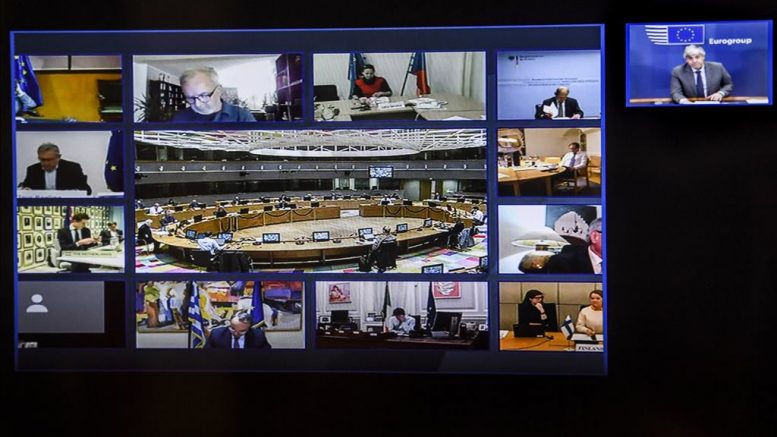The European Union’s reaction to coronavirus and its economic implications continues to defy the doom merchants. In the face of the usual Eurosceptic predictions of its collapse it has proved that economics do not always override politics, writes Murray Ritchie.
Finding agreement for the EU’s €500 billion coronavirus rescue fund provoked much impassioned argument, but the outcome proved again that the long-heralded demise of the bloc was avoided. It was ever thus. The EU has a long history of muddling through, finding agreement when none seemed possible, surviving crises and turning on its head the received wisdom that economics always drives politics.
Time and again whenever calamity threatens, the EU’s most hostile commentators – mainly in the British press – insist that this time it could well be fatal. The EU will crumble, the idea of a united Europe will finally be extinguished.
They never seem to learn. That is not to deny the EU has one huge challenge on its hands in combating Covid19 – but so has everyone. Those naysayer voices always make the same mistake. They compare the EU to a nation state which emphatically it is not and might never be. Which is why it is so accomplished at placing politics ahead of economics when the need arises.
Whenever a financial crisis like this comes along – the banking catastrophe of 2008 was another example – the EU debates, argues, falls out with itself, and then returns as it always does to its famous genius for finding enough common ground to come through in difficult times.
In the midst of the coronavirus crisis Emmanuel Macron, the French president, neatly explained the point in an interview last week with the Financial Times. Arguing that richer EU member states had a special responsibility in meeting the challenge of Covid-19 he said: “We are at a moment of truth, which is to decide whether the European Union is a political project or just a market project. I think it’s a political project … We need financial transfers and solidarity, if only so that Europe holds on.”
And hold on it did, showing its defiant commitment to political solidarity. Over the decades the EU has consistently defied Margaret Thatcher’s famous article of faith that – “you can’t buck the markets”. coronavirus is just the latest example of many.
Look back to the fall of the Berlin wall in 1991 when Chancellor Helmut Kohl of Germany wanted reunification with the old East Germany. He wanted parity for the near worthless East German Ostmark and the mighty Deutsche Mark. Until that moment all of Europe was under the impression that the Bundesbank was fiercely independent. No politician would be allowed to get their sticky fingers on policy.
Wrong. Kohl killed off that fallacy with one phone call to the boss of the Bundesbank. “One for one,” he commanded, against contrary advice from the money markets. It was a purely political act which his critics said was economically impossible, but it worked.
Later came the birth of the euro accompanied by a cacophony of derision from the Eurosceptic terraces. Books flooded the market showing how Europe would collapse into street rioting and flames. one conservative commentator in the UK’s Daily Telegraph spoke for many when she predicted the euro would crash and burn in three months. She is still saying much the same today. Yet here we are more than 20 years on and the euro is doing just fine. Sure, it will have its ups and downs but don’t all free currencies?
Admittedly the single currency did provoke some serious upset in Greece and strain in Italy and Spain. But they survived. Greece does so because in Athens and Brussels politics firmly guided the economics – as it did and continues to do. To believe this won’t work is to misunderstand the political and social dogma that drives the European Union. Whenever the EU’s big constitutional ambitions are threatened by squabbling, politics comes riding to the rescue.
‘The EU is, of course, a lot more than a monetary area. It is a peace project, a realm of shared culture, a source of identity and an opportunity to stem toxic nationalism,’ Yanis Varoufakis
The inclusion of Greece might well have been one case where politics got ahead of itself for a time. So desperate were the pro-single currency EU member states and the European Commission to have everyone in the euro club that they allowed Greece blatantly to break all the convergence rules. Greece couldn’t wait to join – and political will and a need to preserve EU unity carried the day. Give the Greeks a choice today and for all their problems they would vote to retain the euro over the drachma.
It was much the same with the EU’s challenging enlargement process around the turn of the century.
Taking in poorer states like Portugal, Ireland, Spain and Greece was one thing – expensive but worth it. Taking in economically crippled former Soviet satellites was quite another. Even the late Bruce Millan who was the British commissioner in charge of regional economics protested: “How on earth are we ever going to pay for them?”
It is a long story but one which some folk simply refuse to learn. Remember the old “widening versus deepening” argument? In those days the then European Community wanted deeper constitutional integration. This was immediately denounced (mainly in London again) as another step to the dreaded federal state. Margaret Thatcher, the United Kingdom’s then prime minister, was among those who opposed deepening because, she said, it diluted national sovereignty. She championed widening eastwards as a means of spreading economic benefit at the expense of political adventurism which appalled her.
She won that argument, for a time, until Europe simply coughed up the money and pressed on with integration. It was hard going but it has proved successful, so far anyway.
Hungary’s current anti-democratic behaviour is putting a strain on EU solidarity but the Brussels pragmatists – unwilling to hit the nuclear option and kick Hungary out of the club – simply take the view that even this mischief will pass.
A successful response to the coronavirus health crisis must go hand in hand with a strong recovery plan for our economies. We’ve made available significant funds to support health systems, companies & protect Europeans’ jobs. But more is to come. We need a Marshall Plan for EU. pic.twitter.com/q6jHY4BZrx
— Ursula von der Leyen (@vonderleyen) April 15, 2020
In its moment of success in reaching agreement – after a struggle – on the coronavirus pandemic and how to battle it, the EU is again being told its future is all but doomed.
Yanis Varoufakis, former Greek finance minister, thinks the half-trillion-euro rescue deal is wrongly structured, pitching countries like Italy into debts they can’t repay. He sees this as a boon to Eurosceptics.
And then he remembers the political import of the EU and how it controls economics.
“The EU is, of course, a lot more than a monetary area. It is a peace project, a realm of shared culture, a source of identity and an opportunity to stem toxic nationalism,” he conceded last week in The Guardian newspaper.
But he could not shake off the familiar pessimism. “If its economic foundation buckles, powerful centrifugal forces already in play are ready to tear the union apart.”
This defies the compelling evidence that whenever a financial crisis like this comes along – the banking catastrophe of 2008 was another example – the EU debates, argues, falls out with itself, and then returns as it always does to its famous genius for finding enough common ground to come through in difficult times.
One suspects the Covid-19 menace is just the latest challenge, enormous and daunting though it may be, that the EU will meet head on and overcome.

Featured Image Credit: © European Union




